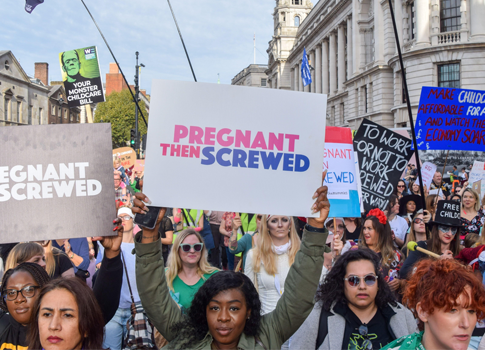What is the government’s broadcasting sector “whitepaper”?
On Thursday 28th April, after much speculation and build-up, Nadine Dorries, Secretary of State for Digital, Culture, Media and Sport, presented a whitepaper to Parliament entitled “Up next – the government’s vision for the broadcasting sector”.
This lengthy document lays out a raft of measures, which would have a significant impact on not only broadcast TV but also subscription video-on-demand services, such as Netflix. These include:
- Giving Ofcom the power to draft and enforce a new “Video-on-demand Code”, which would bring all “TV-like” programming under similar standards to broadcast TV. As a result, UK audiences would be able to complain to Ofcom if they are offended by content on platforms such as Netflix.
- Introducing a new “prominence regime” for video-on-demand services. This would ensure that content made by British public service broadcasters is featured prominently, or otherwise easy to find.
- Giving public service broadcasters more flexibility in how they deliver their obligations. Currently, the UK’s public service broadcasters (BBC, ITV, Channel 4 and Channel 5) are required by law to produce content considered beneficial to the public good – such as news, current affairs programming, films and documentaries. The government does not intend to remove this requirement entirely, but instead be less prescriptive in how it must be fulfilled.
What are the government’s plans for Channel 4?
However, the announcement within the whitepaper which has drawn by far the most coverage is the privatisation of Channel 4. The presentation of the whitepaper marked the formal beginning of this process – which the Government has been threatening for some time. In June 2021, then-Culture Secretary Oliver Dowden first announced a public consultation on the possibility of privatisation. Then, at the very beginning of April 2022, Dorries tweeted that she had “come to the conclusion that government ownership is holding Channel 4 back from competing against streaming giants like Netflix and Amazon.” This announcement was immediately met with widespread opposition from the British media industry, Channel 4’s current management, and a large number of MPs – including many from Dorries’s own party.
Currently Channel 4 operates under a unique business model, devised by Margaret Thatcher’s government: the broadcaster is publicly-owned but commercially-funded. It carries advertising, but is required to reinvest profits into new programming, all of which must be commissioned from independent businesses. Like all public-service broadcasters, Channel 4 also has an obligation to produce culturally important content. These factors make Channel 4’s current business model unattractive to a private owner seeking to maximise profits.
Analysts at market research firm Ampere have argued that a profit-seeking owner could successfully cut Channel 4’s programme budget by 40% or even 50%, whilst still fulfilling public service broadcasting requirements. However, this would ultimately affect the quality of on-screen content and could potentially put as many as sixty small production companies out of business. Prior to the pandemic, Channel 4 had a programme budget of around £660m a year; by contrast, Channel 5 which is owned by the US company Paramount, spends just £240m annually. Any changes to Channel 4’s current business model would have to be monitored by Ofcom, although the recently-appointed Head of Ofcom Michael Grade is a vocal supporter of privatisation.
Ministers state they have received more than two dozen expressions of interest in buying Channel 4, although currently no potential purchasers have publicly stated their intentions.
What alternatives are there to privatisation?
Despite high-profile supporters such as Michael Grade, and Minister of State for Media, Data, and Digital Infrastructure Julia Lopez, there are doubts whether the government has enough political support to pass the necessary legislation. As mentioned previously, Nadine Dorries has faced a great deal of opposition and criticism to her proposal across the full political spectrum, with many MPs concerned about potential job losses in their constituency, if a new private owner fails to prioritise commissioning independent producers.
On May 5th, Channel 4 announced their alternative proposal to privatisation entitled “4: The Next Episode.” Prior to its publication, in a column for The Sunday Times, Channel 4’s chief executive Alex Mahon described this proposal as “[accelerating] our existing digital strategy as well as multiplying the secondary benefits of public ownership, such as job creation and skills building outside London — in places where private media companies generally don’t invest.”
Highlights of “The Next Episode” include a promise to increase the number of roles available outside of London; selling off their headquarters in Victoria, central London; a commitment to commissioning at least 50% of content annually from outside of London; and doubling investment in the 4Skills training programme. Through these measures, Channel 4 hope to position themselves as the “levelling-up broadcaster” – in line with the Government’s broader commitment to “levelling up.” Channel 4 have previously dodged privatisation in 2017 by following a similar strategy: in a deal with then-Culture Secretary Karen Bradley, the broadcaster agreed to move large parts of its operations outside of London. As well as providing new regional employment opportunities, Channel 4 also promise that by 2026 the UK economy would make more in gross value by following their own plan than would be made in profit from a one-off sale.
In addition to proposing their own plan, Channel 4 have also recently taken steps to reduce their dependence on traditional TV advertising. In a ground-breaking deal with Youtube, Channel 4 have agreed to make over 1,000 hours of hit shows available to watch for free, in return for selling advertising around the programmes. Whilst Sky and BT have previously experimented with free-to-air distribution on YouTube, often to boost audiences for sporting events, Channel 4’s deal will be the first of its kind. The hope is that YouTube will allow Channel 4 to better target young audiences.






